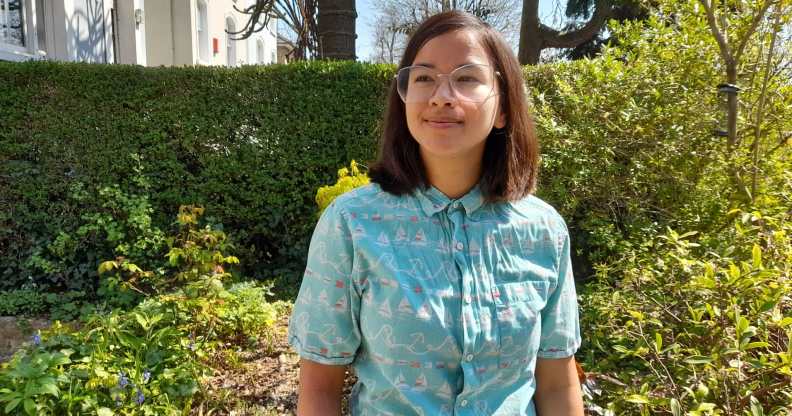Overwhelming majority of young lesbians have felt lonely and isolated during the pandemic

Pippa Sterk, a young lesbian ambassador for Just Like Us. (Just Like Us)
Of all LGBT+ young people, lesbian youth in the UK are most likely to have experienced tension at home during the pandemic, according to a new survey.
The research was commissioned by LGBT+ youth charity Just Like Us, with the data on young lesbians published to mark the beginning of Lesbian Visibility Week (26 April – 2 May).
The charity surveyed 2,934 secondary school pupils, including 1,140 young LGBT+ people, aged 11 to 18 across 375 UK schools and colleges.
The survey found that of all young LGBT+ people, lesbian youth were the most likely to experience “tension at home, such as arguments with family, on at least a weekly basis”.
Six in 10 (61 per cent) young lesbians said they were experiencing this kind of tension, compared to 54 per cent of LGBT+ youth as a whole and 37 per cent of non-LGBT+ youth.
Lesbian youth were also more likely than other groups “to report feeling lonely and separated from the people they are closest to on a daily basis since the pandemic began”.
Almost nine out of 10 (87 per cent) young lesbians said they felt lonely and isolated from the people they are closest to during the pandemic, and 60 per cent said they felt like this every single day.
In contrast, 54 per cent of young bisexuals, 52 per cent of young trans people and 46 per cent of gay boys said they felt this way on a daily basis.
Close to eight in 10 (78 per cent) of lesbian youth in the survey said their mental health had worsened throughout the pandemic.
Pippa Sterk, a young lesbian ambassador for Just Like Us, said: “I have been lonely during lockdown, because my main social circle consisted of other LGBT+ people.
“Because we’re not a biological family, we have always gathered in public spaces, rather than the more traditional household.”
Sterk said she has lesbian friends who during the pandemic have had to “return to families that are unaccepting, and either go back into the closet or live with tension hanging over their heads 24/7”.
Maya (name changed), is one young lesbian who has been forced back into the closet while in lockdown with her family.
Although Maya said her family is “not homophobic at all”, she has not yet come out as a lesbian to them, which has left her feeling “not able to fully be herself” while stuck at home.
She said: “The reason I haven’t come out is because I’ve never had a serious relationship and I’m quite a private person, so the topic hasn’t really come up.
“Yet I still feel the need to somewhat hide my sexual orientation because of the assumption of heterosexuality as the norm and being gay as something ‘different’ that needs to be revealed… It’s uncomfortable not being able to fully be myself; I feel like there’s a small piece of me closed off in what’s otherwise a safe space for me.”
“I think the loneliness is the hardest part of the pandemic for me,” she continued.
“I have an underlying health condition which makes me vulnerable to COVID, so whilst my friends were meeting up with each other pre-lockdown I often couldn’t join them.
“In contrast to my family, I can really be myself around my friends, so it’s difficult not seeing them.
“I feel much more connected talking to people in real life rather than via text so that reinforces my feelings of isolation.”
Dominic Arnall, chief executive of Just Like Us, said that positive messaging from schools about LGBT+ identities could help lesbian youth fare better during the COVID-19 pandemic.
“It’s really concerning to see that young lesbians are disproportionately facing tension at home and highlights just how much LGBT+ young people need positive messaging from their schools that it’s OK to be who they are,” he said.
The charity runs School Diversity Week, a celebration of LGBT+ equality in education, and Arnall said that the event can help schools support young people suffering from loneliness and isolation.
He added: “We want to make it really easy for schools to support their pupils so we’ve launched a new online toolkit of teaching resources that all schools can access for free by signing up to take part in School Diversity Week.”

